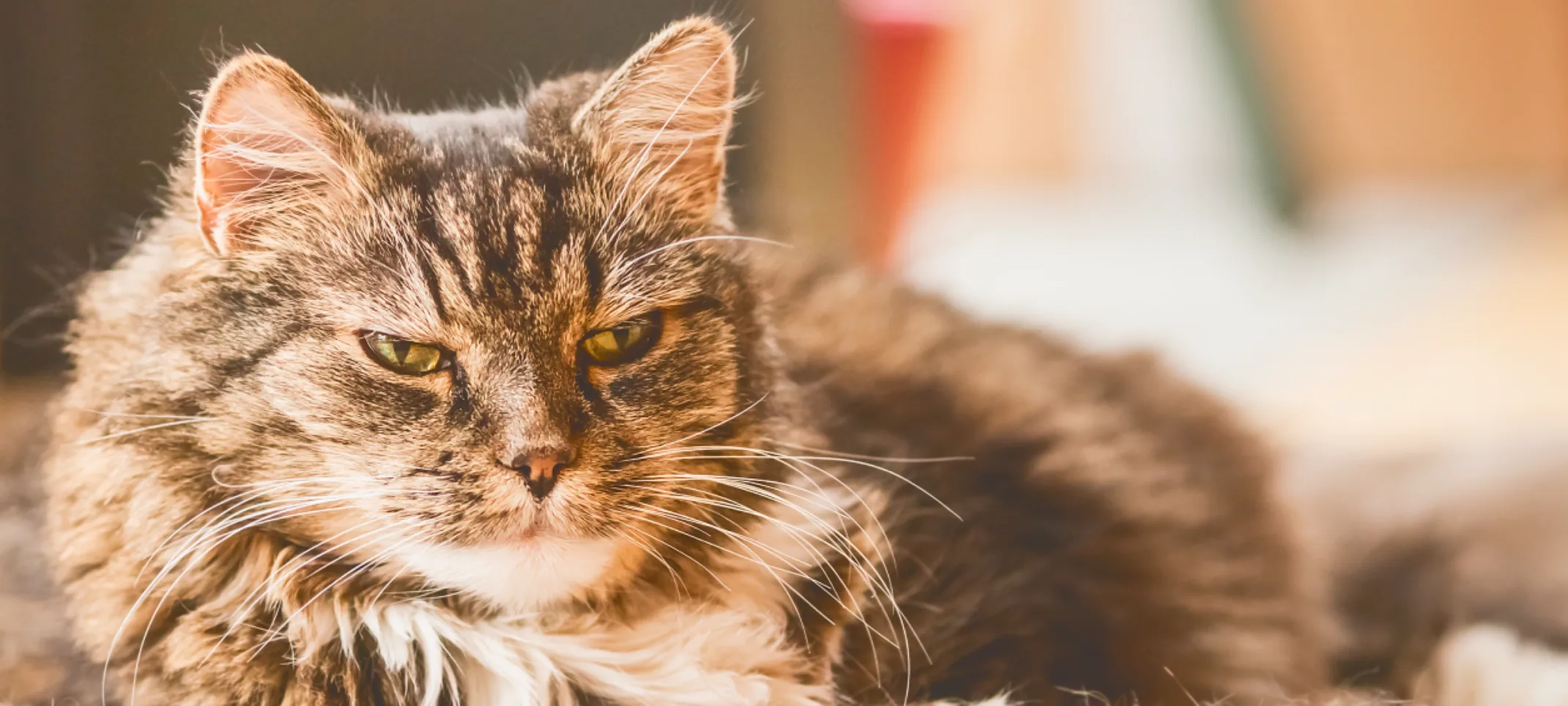Southeast Veterinary Oncology & Internal Medicine (SEVO-Med)
Radioactive Iodine Therapy (I-131)
Treatment for hyperthyroidism or thyroid cancer.

What is Radioactive Iodine Therapy (I-131)?
If your pet has an overactive thyroid gland (hyperthyroid) OR if he/she has been diagnosed with thyroid cancer, the doctors at SEVO-Med may prescribe radioactive iodine (radioiodine) as part of your pet's overall treatment.
Radioiodine Therapy is a radioactive treatment that when injected into the body is taken up by the thyroid gland. The normal thyroid tissue is relatively “protected” from the effects of radioiodine because the I-131 is preferentially taken up by abnormal and hyper-functional tissue. Once the abnormal nodule or tissue is destroyed, the remainder of the thyroid tissue performs normally again.
More About I-131 Treatment
The thyroid gland produces hormones that regulate your pet’s metabolism. To produce these hormones, the thyroid gland normally utilizes iodine in the diet, found mostly in seafood and salt. Our doctors take advantage of the thyroid tissue’s ability to “trap” iodine and use radioiodine to treat overactive thyroid glands (and some types of thyroid cancer). Fortunately, with this treatment, very little radiation exposure occurs to the rest of your pet’s body. For more than 50 years, radioiodine has been used in the treatment of human thyroid disease. We have been treating our veterinary patients here at SEVO-Med for five (5) years.
Radioiodine (I-131) therapy typically has few side effects. Upon administration, however, side effects may occur when very large doses are given. Such side effects may include irritation of the salivary glands, gastrointestinal tract, or urinary bladder. We see this irritation in less than 1 percent of our treatment population. Complications resulting after the treatment will be discussed in a later section of this handout.
What is Hyperthyroidism?
The most common endocrine disease we see in cats is hyperthyroidism. In 98% of feline patients, it is due to a benign tumor or hyperplasic tissue. Anti-thyroid oral drugs (methimazole, a.k.a. tapazole) may effectively control hyperthyroidism in those feline patients who are ineligible for radioiodine. Ineligibility is most likely due to their kidney status. If, after three to six months of treatment with oral medications, the hyperthyroidism symptoms persist (symptoms include weight loss, ravenous appetite, vomiting, diarrhea, and behavioral changes), then the recommended treatment for permanent control of an overactive thyroid is the use of radioiodine. Sometimes radioiodine is advised because your pet just will not take pills. Sometimes it is advised because the pills make your pet sick (vomiting, diarrhea, liver toxicity, severe scratching, to name a few). In most pets, hyperthyroidism is cured by a single dose of radioiodine; the rest respond to a second dose.
Preparing for I-131 Treatment
Treatment is very simple and easy. We will recommend a full diagnostic work-up to make sure your cat is a good candidate for this treatment. Diagnostic screening will consist of blood work (CBC, Chemistry Panel, and may include a Thyroid panel with Free T4), urinalysis, radiographs (x-rays), and possible ultrasound of the heart and abdomen.
If your cat is on antithyroid medications such as methimazole (Tapazole), this must be discontinued at least one week before your cat’s scheduled admission for treatment.
If your cat is currently on Hill’s Prescription y/d diet, that will need to be discontinued one month prior to your cat’s scheduled admission for treatment. You will need to speak with your vet about discontinuing either the methimazole or the y/d as other medications may be recommended.
Please discontinue all supplements one week prior to your cat’s scheduled treatment.
After the staging evaluation, your cat will be scheduled for I-131 treatment. Typically this occurs one week following the initial consult and diagnostic workup.
During and After I-131 Treatment
Your cat’s length of hospitalization/boarding varies from four-to-six days to approximately two weeks for dogs.
A one-time subcutaneous injection will be given in the morning. At this point your cat CANNOT BE released any earlier than three (3) days post-treatment under any circumstances, longer for dogs. No visitation is permitted with your pet due to radiation safety concerns, but you can call our hospital for a daily report on your pet.
The I-131 ward is a limited-access area staffed by experienced personnel trained to work with radioactive materials. Your cat will be in a large, condo-style cage away from noise and dogs* and will be fed and offered fresh water twice daily. Dogs are boarded in a moderately sized run. Unfortunately, due to radioiodine levels, your pet is forbidden to step outside of the limited access area including going outside. If your pet is on a special diet, please let us know. You may bring your pet’s favorite toy or bedding but please understand that such items cannot be returned to you after your cat goes home due to radioiodine I-131 contamination.
*Please be advised that we make every possible effort to not have dogs in for I-131 treatment as the same time as your pet. However, sometimes this is unavoidable. You will be notified shall a dog be scheduled at the same time as your pet.
I-131 Treatment for Thyroid Cancer
Thyroid carcinoma can be treated with high-dose radioiodine because the cancer cells are able to take up some iodine. It is preferable to obtain an uptake scan prior to radioiodine to ensure the thyroid gland cells will trap iodine.
If your pet has a newly diagnosed thyroid cancer and the oncologists advise surgical removal of your pet’s thyroid gland, you will be advised to withhold thyroid hormone replacements post-surgery. This will stimulate any remaining thyroid tissue to use more iodine. Then your pet may receive a dose of radioiodine. This treatment can eliminate the possibility of recurrent cancer in whatever thyroid tissue remains.
After I-131 Treatment
When your pet is cleared to go home, there will be a two-week confinement period. It is imperative you follow these restrictions as indicated both for your own safety and to avoid problems at your local trash processing facility.
You will have to sign a release form that states there will be no contact between your pet and children under the age of 18,
Pregnant women, and women trying to become pregnant.
There will be no prolonged contact with your pet for that two-week period (sleeping in the same bed or lap-lounging while watching TV).
Litter excrement (cats only) must be flushed daily OR stored for a three-month period. This will be detailed at your initial consultation.
After the additional two-week restriction period, you and your pet can resume your normal lifestyle. If successful, the treatment usually results in permanent correction of the hyperthyroid state.
The State of Florida mandates confinement because some of the iodine will not be absorbed by the thyroid and will leave the body primarily through urine. Small amounts will also be present in your pet’s saliva and feces. Nearly all radioactive iodine will leave the body during the first two (2) days after the initial dose is given.
Follow-Up
We plan to see your pet back in one month for a recheck of the thyroid level and organ function. Three months post-treatment, you will see your referring veterinarian for the same tests. If at that point your pet’s thyroid is in the normal range (90% success rate in the United States) then they are considered cured. NOTE: Some patients with malignancies may have a more vigorous recheck schedule.
Possible Complications After I-131 Treatment
There are a few complications that may result after initial treatment. SEVO-Med will do everything possible to prevent complications from happening by performing a diagnostic work-up prior to treatment and detailing the risks. The most common complication we see after treating these cats is hypothyroidism, which is when the thyroid is LOWER than normal. 18% of cats treated at SEVO-Med have become hypothyroid. In most cases, a supplement will need to be given if the level is very low. Thankfully, most cats can be taken off thyroid supplements after a few months when the normal thyroid tissue begins to do its job again.
The second complication is treatment failure. This is most likely because of a malignant thyroid gland. It is also possible that a second treatment might be necessary in pets without malignancy. SEVO-Med has had a five percent treatment failure.
The third complication is renal insufficiency or failure. Out of 169 cats treated at SEVO-Med, only four have gone into renal failure. Other less frequently reported complications include hair loss at the injection site and thyroid storm. The doctors will do everything in their power to determine your pet's risk and will inform you.
Ultimately, you will determine if the benefits outweigh the risks. At your consult, we will go over this with you in more detail and you will have the opportunity to ask us any questions that you may have.
